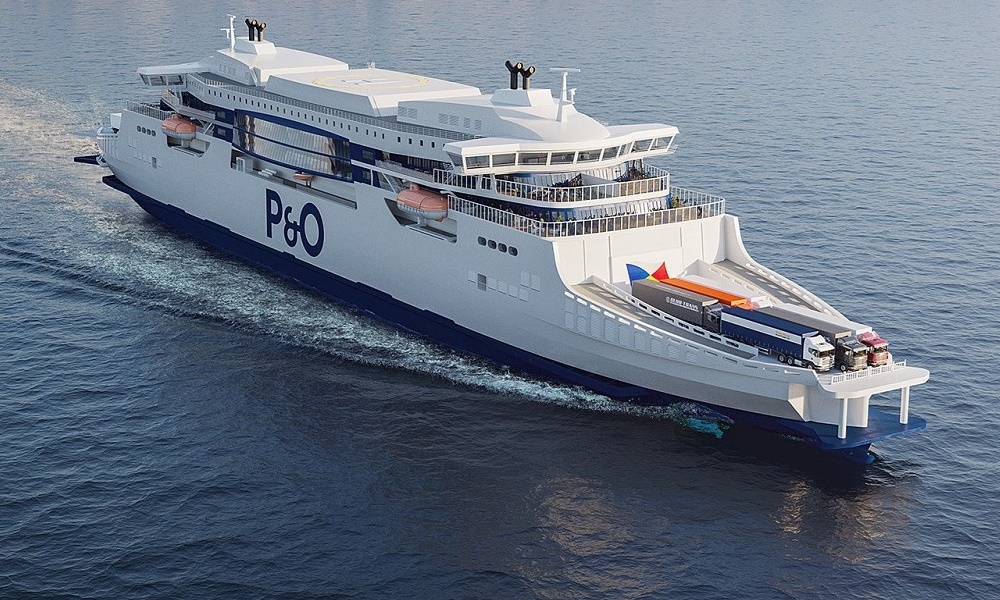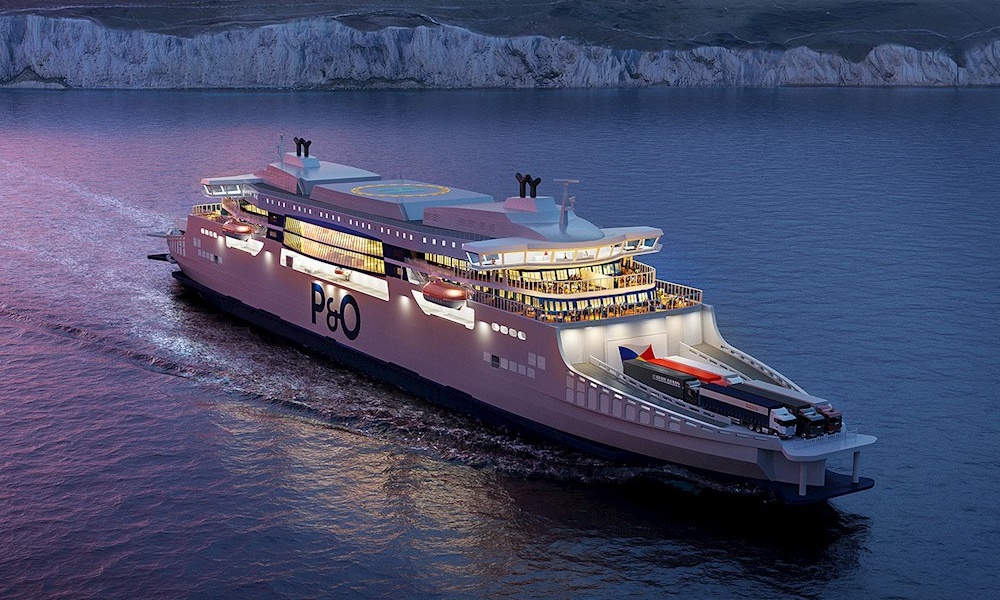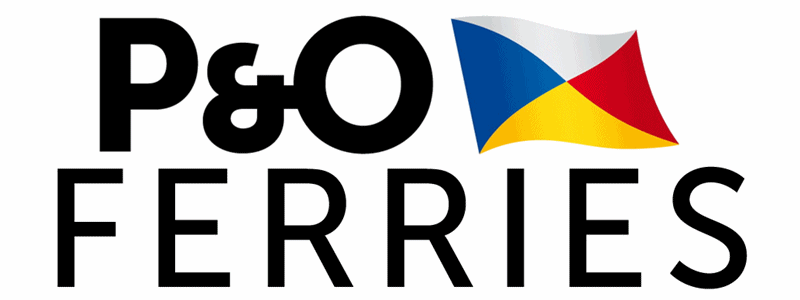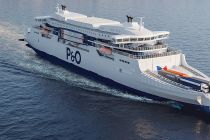PO Pioneer ferry
Former name: GUANGZHOU 19121007
PO Pioneer ferry current position
The current location of PO Pioneer ferry is in North Sea (coordinates 50.96739 N / 1.85699 E) cruising en route to DOVER-CALAIS-D1000. The AIS position was last reported 39 seconds ago.
Current PositionSpecifications of PO Pioneer ferry
| Year of build | 2023 / Age: 2 |
| Flag state | Cyprus |
| Builder | COMEC Guangzhou Shipyard (Nansha-Guangzhou, China) |
| Class | double-ended ferry/Ro-Pax ship |
| Ferry route / homeports | Dover-Calais |
| Building cost | EUR 130 million / USD 145 M / GBP 110 M |
| Engines (power) | Wartsila (39.2 MW / 52568 hp) |
| Propulsion power | 30 MW / 40231 hp |
| Speed | 21 kn / 39 km/h / 24 mph |
| Length (LOA) | 229 m / 751 ft |
| Beam (width) | 30 m / 98 ft |
| Gross Tonnage | 47653 gt |
| Passengers | 1500 |
| Crew | 80 |
| Cars | 200 |
| Freight vehicles | 175 |
| Decks | 7 |
| Sister-ships | P&O Liberte |
| Former names | GUANGZHOU 19121007 |
| Christened by | tba |
| Owner | P&O Ferries Cyprus Ltd |
| Operator | P&O FERRIES UK |
PO Pioneer ferry Review
Review of PO Pioneer ferry
MS P&O Pioneer ferry is a Ro-Ro passenger vessel owned and operated by the UK company P&O FERRIES. The ship has a max capacity of 1500 passengers and 200 cars and 175 lorries/semi-trailer trucks. The vessel was launched in 2022 (inaugurated in 2023 June) and operates on the UK-France/English Channel route Dover-Calais (crossing time 1,5 hours) together with the sistership P&O Liberte.
The vessel (IMO number 9895161) is currently Cyprus-flagged (MMSI 210385000) and registered in Limassol.
Cabins
The ferry P&O Pioneer has no cabins (passenger staterooms) due to the route's short crossing distance. Instead, the ship offers Reserved Seating Lounge (luxury Club-class bar lounge furnished with comfortable leather couches).
Reserved seats are available for pre-booking. These deals are inclusive of complimentary beverages (champagne, tea, coffee, soft drinks) and newspapers.
Shipboard facilities and amenities
The ship design features two large glass walls (portside and starboard, each 2-deck-high/spanning decks 8-9) to allow natural light into the public areas and provide passengers with unobstructed outside views. Each ship also has ~1500 m2 (16145 ft2) of outdoor deck space for panoramic sea views.
P&O Pioneer ship's main passenger-accessible facilities include The Food Court (buffet-style restaurant), Brasserie (French restaurant serving gourmet food and fine wines), patisseries (coffee shops serving light snacks, pastries, hot and cold beverages), shops, Starbucks Coffee Bar.
Pioneer Lounge is the main bar lounge with comfortable seating and served by its own bar (light snacks and drinks /tea, coffee, sodas).
Shipboard shopping offers a wide choice of brand products to be purchased at discount/cheaper in comparison to UK high street prices. Up to 40% discounts are offered on luxury brand perfumes, skincare, and cosmetics. Up to 30% discounts are offered on alcohol (spirits, wines, beers). The shops also sell bestseller books, newspapers, magazines, toys, games, electronics.

The ship is entirely non-smoking, and smoking is not permitted even on the outdoor deck areas.
The ferry has no children-dedicated staff or facilities (Arcade, Playroom) and doesn't provide kids' entertainment (supervised activities).
The top deck houses the Helideck (midship helicopter landing area used in cases of emergency) and the communication equipment (radars, antennas).
Six lifts (passenger elevators) and indoor staircases connect all passenger decks with the garages/cargo decks.
Ship technology
Being currently the world's largest/longest double-ended ferries, each vessel has two Wheelhouses/Navigation Bridges (one on each end). P&O decided to use the double-ended hull design to save ~10 min of in-port docking/undocking time as there is no need to maneuver for berthing or departing the dock. The four Azipods are in-hull mounted (2x bow, 2x stern) and can rotate 360 degrees, providing better maneuverability.
The double-ended ferry design allows vehicles to be loaded/unloaded via the ship's both ends (bow and stern). Such ferryboats are used mainly on short routes (including river crossings) as they save maneuvering time and lower fuel consumption (and risks) before docking. A unique feature for such ships is the doubled propulsion (identical units installed at each end). This results in better stopping power and greater maneuverability in comparison to standard ferries.
The WHRS system provides heating for the fuel tanks, fuel heaters, fuel purifier heaters, as well as for the HVAC system (Heating, Ventilation, Air Conditioning) producing hot water and also heating the machinery rooms and all spaces below Deck 8. A computer-based power management system alows additional energy/fuel savings by turning off the lighting and ventilation (in empty areas), optimizing the powerplant/battery/waste heat recovery systems. Additional energy is saved as the design allows up to 2/3rds of the vessel to be closed during off-peak crossings.
The ship's batteries are by XALT Energy (Midland Michigan USA-based company specializing in lithium-ion cells, battery packs and system development). They have enough power capacity to allow leaving the homeports without powering the diesel generators. Being plug-in ready by design, the ship's propulsion can be converted from diesel-electric to battery-electric in the near future. Currently, the batteries are charged with the diesel engines' surplus energy and discharged when the boat requires peaks of power.

Car decks
The ferry has three cargo decks/garages, including two for trucks (Lower and Main) and one for the cars/vans (Upper).
- All onboard emergency instructions are displayed in staterooms, on the TV screens and at the ship's assembly stations (aka muster stations). Life jackets are issued at the assembly stations. In case of emergency, the use of elevators/passenger lifts is forbidden.
- Disabled passengers or those requiring specific assistance should visit the ship's Information Desk (open 24-hours).
- Apply handbrake and place the vehicle in park or 1st gear position. Switch off the ignition, alarm, electrical equipment, headlights. Gas cylinders, if any, must be switched off. Lock the vehicle.
- From your vehicle take only valuables and essential hand baggage.
- Make a note of your vehicle's location and garage deck number/stairway before leaving the car deck.
- Access to the ship's vehicle (cargo) decks during the voyage is prohibited.
- Smoking on vehicle decks, as well as in cabins and passenger lounges is forbidden.
- Wait for the onboard announcement before returning to your vehicle.
In order to avoid air pollution, don't start the engine until instructed.

The shipowner P&O Ferries (fleet, 2002-founded, headquartered in Dover England) is a UK ferry company operating on the shipping routes UK-France, UK-Ireland, UK-Holland (mini-cruises), UK-Belgium (mini-cruises) and Scotland-Northern Ireland.
PO Pioneer ferry ship related cruise news
- Cruise Industry

Wartsila secures lifecycle agreement with P&O Ferries UK for hybrid ships
Finnish technology conglomerate Wartsila has recently inked a lifecycle agreement with the UK-based passenger and cargo shipping company P&O...
March 18, 2024 - Cruise Industry

P&O Pioneer ferry to debut with freight-only sailing Dover-Calais
According to the timetables of P&O Ferries, the company's newest ship in the Dover Strait - P&O Pioneer, will soon start revenue operations...
June 12, 2023 - Cruise Industry

P&O Ferries takes delivery of the first of 2 new “fusion class” ferries for its Dover-Calais route
Dover-based ferry company P&O Ferries took delivery of the first of 2 new “fusion class” ships for its Dover (England UK)-Calais...
March 2, 2023 - Cruise Industry

P&O Ferries' new hybrid ships cannot charge at Dover/Calais docks
P&O Ferries UK came under criticism for its purchase of 2 new hybrid electric cruiseferries despite a lack of suitable shore-power/in-port...
March 1, 2023 - show more news
Other P&O FERRIES cruise ships
PO Pioneer ferry Wiki
The vessel (Guangzhou yard/hull number 19121007) has volume 47653 GT-tons, DWT-deadweight tonnage 8850 tons, max draught 5,6 m. The powerplant is based on four Wartisla marine diesel engines (model 16V31) with combined output 39,2 MW (52570 hp). The propulsion system is based on four Azipod thrusters (model ABB DO1600) with combined output 30 MW (40230 hp). The registered shipowner is DUBRIS LEASING 1 SNC, while the registered manager is P&O FERRIES LTD.
P&O FERRIES signed the shipbuilding contract (for two vessels/total cost EUR 260 million / GBP 220M) with GSI-Guangzhou Shipyard International (COMEC) on September 26, 2019. The project was based on the design developed by OSK-ShipTeck AS (Copenhagen Denmark-based maritime consultancy and design company) and Guangzhou SinoDane Ship Design Co Ltd. The double-ended hull RoPax ship design is for max passenger capacity 1500 and cargo capacity 3600 lanemeters (2800 lm for wheeled cargo/trucks and 800 lm for passenger vehicles/cars and vans). The first unit (P&O Pioneer) was scheduled for delivery in 2023-Q2, the second unit (P&O Liberte) in 2024-Q1.
Both cruise ships were intended for P&O's Dover-Calais service (to replace the 1991-built sisterships Pride of Kent and Pride of Canterbury), making them the largest-ever (by both length and capacity) deployed on this route. Using a hybrid/diesel-electric propulsion system reduces ~1 ton of diesel fuel per English Channel crossing. The system is based on four Wartsila 31 engines (16V31 diesels) that generate the electricity to power the four Azipods (azimuth thrusters/electric motor + steerable pod with a fixed propeller). In addition to the diesel engines, each cruiseferry is also fitted with a battery pack (capacity 8,8 MWh), plug-in ready (by design) and a WHRS (Waste Heat Recovery System) that uses the waste heat from the engines to generate electricity. All the implemented technologies allow to ~40% less fuel consumption in comparison to the older ferries (smaller-sized) Pride of Kent and Pride of Canterbury.
The 1954-founded shipbuilder GSI (now COMEC/CSSC Offshore and Marine Engineering Co Ltd) is part of CSSC-China State Shipbuilding Corporation (1982-founded, one of China's top 10 defense groups).
The ship's four Wartsila 31 diesels are 4-stroke/16-cylinder engines (running on ULSFO-Ultra-Low Sulphur Fuel Oil) with total power output 39,2 MW (4 x 9,8 MW). ABBs' Azipods are model DO1600, with combined power output 30 MW (4 x 7,5 MW).
- ABB Ltd (1988-founded Swedish-Swiss corporation based in Zurich) was contracted by GSI Shipyard in September 2020, and the order included ABB Ability Marine Pilot Control (bridge-control automation system), ABB Power2 (turbocharging system/improves power efficiency/up to 5% less fuel consumption and ~60% less NO emissions), ABB PEMS (Power and Energy Management System) and the ABB Azipods (first introduced in 1990).
- Wartsila Oyj Abp (1834-founded Finnish corporation) was contracted by GSI Shipyard in October 2020 to deliver the engines for both new ferries.
- Light Structures AS (2001-founded, supplier of fiber optic monitoring systems based on Fibre Bragg Grating) was contracted by GSI Shipyard in July 2022 to provide SENSFIBTM Global+ (Hull Stress Monitoring System) for both vessels. The system monitors the hull's stress loading (providing real-time data) which optimizes the drydock maintenance schedule.
P&O Pioneer's construction (yard number/hull GUANGZHOU 19121007) started on October 15, 2020, with the steel-cutting ceremony held at GSI Shipyard. The vessel's physical construction started with the keel-laying ceremony on December 21, 2020. The ship was launched/floated out from drydock on January 2, 2022. South China Sea trials were conducted in 2022 in two phases - September 23-27th, and November 13th. PO Pioneer docked at Port Nansha's International Cruise Terminal (alongside Moby Fantasy) on December 24th.
P&O Pioneer left China (Nansha) on March 3, 2023, en route to the UK. During the relocation voyage, the ferryboat made bunkering stops (for provisioning and fueling) in Singapore (March 7/anchorage), and Colombo Sri Lanka (March 11-12), passing the Suez Canal (March 20) and a bunkering stop in Gibraltar (Mar 27). The boat arrived in England on Mar 30 (anchorage at Port Poole through April 1st) and docked in Dunkerque (France) on Apr 3rd.
Formalized in January and officially signed in March 2024, P&O Ferries has a lifecycle ship maintenance agreement with Wartsila for the China-built sisterships MV Pioneer and MV Liberte. The agreement encompasses spare parts and regularly scheduled maintenance services, as well as maintenance planning, real-time operational support, and Wartsila’s Expert Insight (predictive maintenance) service. Part of Wartsila’s Lifecycle Agreements, Expert Insight uses AI/artificial intelligence and advanced engine diagnostics to help shipowners improve asset efficiency and reduce operating costs and greenhouse gas/GHG emissions. With the real-time assistance of a Wartsila expert, the Expert Insight service identifies anomalous behavior (spots and addresses machinery/system problems) before they can develop into major technical issues.

